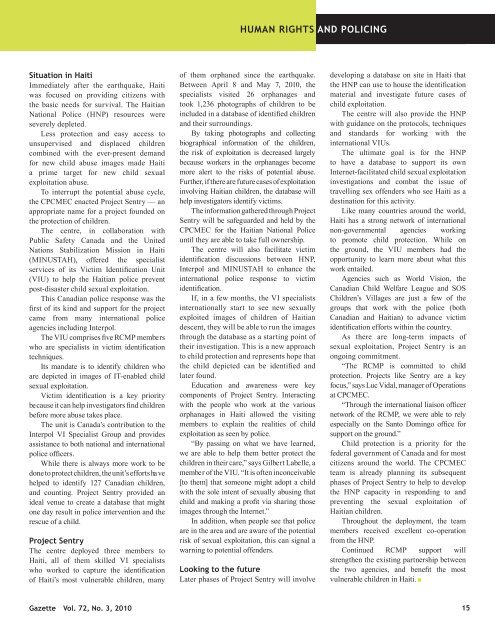RCMP Gazette Human Rights and Policing - Alberta Hate Crimes ...
RCMP Gazette Human Rights and Policing - Alberta Hate Crimes ...
RCMP Gazette Human Rights and Policing - Alberta Hate Crimes ...
You also want an ePaper? Increase the reach of your titles
YUMPU automatically turns print PDFs into web optimized ePapers that Google loves.
huMAN RiGhTS AND POliCiNG<strong>RCMP</strong> COVERSituation in haitiImmediately after the earthquake, Haitiwas focused on providing citizens withthe basic needs for survival. The HaitianNational Police (HNP) resources wereseverely depleted.Less protection <strong>and</strong> easy access tounsupervised <strong>and</strong> displaced childrencombined with the ever-present dem<strong>and</strong>for new child abuse images made Haitia prime target for new child sexualexploitation abuse.To interrupt the potential abuse cycle,the CPCMEC enacted Project Sentry — anappropriate name for a project founded onthe protection of children.The centre, in collaboration withPublic Safety Canada <strong>and</strong> the UnitedNations Stabilization Mission in Haiti(MINUSTAH), offered the specialistservices of its Victim Identification Unit(VIU) to help the Haitian police preventpost-disaster child sexual exploitation.This Canadian police response was thefirst of its kind <strong>and</strong> support for the projectcame from many international policeagencies including Interpol.The VIU comprises five <strong>RCMP</strong> memberswho are specialists in victim identificationtechniques.Its m<strong>and</strong>ate is to identify children whoare depicted in images of IT-enabled childsexual exploitation.Victim identification is a key prioritybecause it can help investigators find childrenbefore more abuse takes place.The unit is Canada’s contribution to theInterpol VI Specialist Group <strong>and</strong> providesassistance to both national <strong>and</strong> internationalpolice officers.While there is always more work to bedone to protect children, the unit’s efforts ha vehelped to identify 127 Canadian children,<strong>and</strong> counting. Project Sentry provided anideal venue to create a database that mightone day result in police intervention <strong>and</strong> therescue of a child.Project SentryThe centre deployed three members toHaiti, all of them skilled VI specialistswho worked to capture the identificationof Haiti’s most vulnerable children, manyof them orphaned since the earthquake.Between April 8 <strong>and</strong> May 7, 2010, thespecialists visited 26 orphanages <strong>and</strong>took 1,236 photographs of children to beincluded in a database of identified children<strong>and</strong> their surroundings.By taking photographs <strong>and</strong> collectingbiographical information of the children,the risk of exploitation is decreased largelybecause workers in the orphanages becomemore alert to the risks of potential abuse.Further, if there are future cases of exploitationinvolving Haitian children, the database willhelp investigators identify victims.The information gathered through ProjectSentry will be safeguarded <strong>and</strong> held by theCPCMEC for the Haitian National Policeuntil they are able to take full ownership.The centre will also facilitate victimidentification discussions between HNP,Interpol <strong>and</strong> MINUSTAH to enhance theinternational police response to victimidentification.If, in a few months, the VI specialistsinternationally start to see new sexuallyexploited images of children of Haiti<strong>and</strong>escent, they will be able to run the imagesthrough the database as a starting point oftheir investigation. This is a new approachto child protection <strong>and</strong> represents hope thatthe child depicted can be identified <strong>and</strong>later found.Education <strong>and</strong> awareness were keycomponents of Project Sentry. Interactingwith the people who work at the variousorphanages in Haiti allowed the visitingmembers to explain the realities of childexploitation as seen by police.“By passing on what we have learned,we are able to help them better protect thechildren in their care,” says Gilbert Labelle, amember of the VIU. “It is often inconceivable[to them] that someone might adopt a childwith the sole intent of sexually abusing thatchild <strong>and</strong> making a profit via sharing thoseimages through the Internet.”In addition, when people see that policeare in the area <strong>and</strong> are aware of the potentialrisk of sexual exploitation, this can signal awarning to potential offenders.looking to the futureLater phases of Project Sentry will involvedeveloping a database on site in Haiti thatthe HNP can use to house the identificationmaterial <strong>and</strong> investigate future cases ofchild exploitation.The centre will also provide the HNPwith guidance on the protocols, techniques<strong>and</strong> st<strong>and</strong>ards for working with theinternational VIUs.The ultimate goal is for the HNPto have a database to support its ownInternet-facilitated child sexual exploitationinvestigations <strong>and</strong> combat the issue oftravelling sex offenders who see Haiti as adestination for this activity.Like many countries around the world,Haiti has a strong network of internationalnon-governmental agencies workingto promote child protection. While onthe ground, the VIU members had theopportunity to learn more about what thiswork entailed.Agencies such as World Vision, theCanadian Child Welfare League <strong>and</strong> SOSChildren’s Villages are just a few of thegroups that work with the police (bothCanadian <strong>and</strong> Haitian) to advance victimidentification efforts within the country.As there are long-term impacts ofsexual exploitation, Project Sentry is anongoing commitment.“The <strong>RCMP</strong> is committed to childprotection. Projects like Sentry are a keyfocus,” says Luc Vidal, manager of Operationsat CPCMEC.“Through the international liaison officernetwork of the <strong>RCMP</strong>, we were able to relyespecially on the Santo Domingo office forsupport on the ground.”Child protection is a priority for thefederal government of Canada <strong>and</strong> for mostcitizens around the world. The CPCMECteam is already planning its subsequentphases of Project Sentry to help to developthe HNP capacity in responding to <strong>and</strong>preventing the sexual exploitation ofHaitian children.Throughout the deployment, the teammembers received excellent co-operationfrom the HNP.Continued <strong>RCMP</strong> support willstrengthen the existing partnership betweenthe two agencies, <strong>and</strong> benefit the mostvulnerable children in Haiti. ▪<strong>Gazette</strong> Vol. 72, No. 3, 2010 15







